-
 Art of Wellness Acupuncture & Traditional Chinese Medicine (TCM)11704 Wilshire Blvd, Suite 295, Los Angeles, CA, 90025
Art of Wellness Acupuncture & Traditional Chinese Medicine (TCM)11704 Wilshire Blvd, Suite 295, Los Angeles, CA, 90025
myartofwellness@gmail.com310-451-5522 Office Hours
MonClosedTue7:30 am --4 pmWed7:30 am --4 pmThu7:30 am -- 4 pmFri7:30 am -- 4 pmSat7:30 am -- 4 pmSunClosedOur office opens from Tuesdays to Saturdays 7:30 am to 4 pm, will be closed on Memorial day, Independent day, Labor day, Thanksgiving day, Christmas and New year.
-
Recent Posts
- Chinese New Year 2026: Year of the Horse
- Acupuncture and TCM Treatment for Perimenopause Symptoms
- How to Treat Insulin Resistance With Acupuncture and TCM
- How to Treat Metabolic Syndrome With Acupuncture and TCM
- How to Treat Syncope With Acupuncture and TCM
- How to Treat Thoracic Outlet Syndrome With Acupuncture and TCM
- How to Treat Dupuytren’s Contracture With Acupuncture and TCM
- How to Treat Nutcracker Syndrome With Acupuncture and TCM
- How to Treat Rosacea With Acupuncture and TCM
- How to Treat Perioral Dermatitis With Acupuncture and TCM
- Lymphatic Drainage With Acupuncture and TCM
- How to Treat Turf Toe With Acupuncture
- How to Treat Nerve Pain With Acupuncture and TCM
- How to Treat Watery Eyes With Acupuncture and TCM
- How to Treat Ovarian Cysts With Acupuncture and TCM
- How to Treat Dystonia With Acupuncture and TCM
- Sign up to receive news and updates and get my free report:“The Top 10 Reasons to Try Acupuncture”

November 2025 M T W T F S S 1 2 3 4 5 6 7 8 9 10 11 12 13 14 15 16 17 18 19 20 21 22 23 24 25 26 27 28 29 30
Herbs
How to Treat Hepatitis With Acupuncture and TCM
Qineng Tan, L.Ac., Ph.D. & Xiaomei Cai, L.Ac., Ph.D.

Fever, fatigue, abdominal pain, jaundice, dark urine–these are possible signs of Hepatitis infection, although many people infected with Hepatitis show no symptoms. For some people, a Hepatitis B or Hepatitis C infection goes away on its own, but in other cases, it can cause serious liver damage, leading to chronic liver disease. Acupuncture and TCM treatment, including Chinese herbs, offer a way to help improve liver function and reduce symptoms of Hepatitis.
There are several variants of the Hepatitis virus that can cause inflammation of the liver, leading to scarring (liver cirrhosis or liver fibrosis), and in some cases leading to chronic liver problems or liver cancer. Hepatitis B (HBV) and Hep C (HCV) are the types of infection that can lead to long-term illness and even liver failure. It is estimated that over 300 million people worldwide are living with the effects of HBV or HCV infections.
There is a vaccination that offers protection against Hepatitis B and Hepatitis A, but there is no vaccine for Hepatitis types C, D, and E. People who have contracted Hepatitis A or an acute form of HBV are usually told to rest and drink lots of fluids. Medical treatment for chronic Hepatitis that lasts for more than six months usually involves antiviral medications that help slow down the spread of the virus through the body. TCM treatment for Hepatitis with acupuncture and herbs works to improve the function of the liver and related organs (spleen, kidneys, gallbladder) and to strengthen the immune system so that the body can overcome the effects of the Hepatitis virus.
What Causes Hepatitis?
There are currently five different types of Hepatitis infection, referred to as: Hepatitis A, Hepatitis B virus (HBV), Hepatitis C (HCV or Hep C), Hepatitis D, and Hepatitis E.
All of these viral infections affect the liver, causing inflammation and possibly scarring, known as cirrhosis of the liver or fibrosis of the liver.
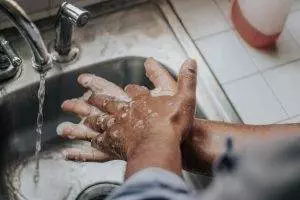
Hepatitis A and E viruses are carried in contaminated water or food supplies. People might contract the Hep A or Hep E virus through eating something like raw shellfish that was in contaminated water, or eating food prepared by a worker who did not wash their hands properly. These variants of Hepatitis may cause an acute infection, but do not lead to chronic conditions.
HBV and HCV are spread through bodily fluids like blood and semen, and can therefore be spread through sexual contact, or the sharing of needles, or a woman may pass the infection to her baby during birth. Hepatitis is a common co-infection in people living with HIV/AIDS. People with Cystic Fibrosis (CF) can also be more prone to infections and liver problems. These more serious forms of Hepatitis can lead to chronic illness, including cancer of the liver, or liver failure, making it one of the primary reasons people end up having a liver transplant.
Autoimmune hepatitis, which has also been called plasma cell hepatitis or lupoid hepatitis, occurs when the immune system mistakenly attacks liver cells.
Top 10 Symptoms of Hepatitis
Symptoms of a HBV or Hepatitis C infection often do not show up for a few weeks, a few months, or in some cases, years later. Some people, especially children, do not feel any symptoms of Hepatitis. The most common Hepatitis symptoms include:
- Abdominal pain, pain in right side
- Swelling in liver area, swollen belly (ascites – fluid buildup in the liver)
- Jaundice, yellow eyes, yellow skin
- Dark urine, pee is dark
- Light colored stools, poop is clay-colored
- Fatigue
- Nausea
- Fever
- Loss of appetite
- Joint pain
Bleeding easily or bruising easily are also potentially signs of Hep C, as is a skin rash, or itchy skin (pruritus), little blisters, or itchy patches of skin like psoriasis. Some people have a sensation of their internal organs itching.
What Is the Treatment for Hepatitis?
If a person shows high levels of liver enzymes and still has the Hepatitis B virus in their body after six months or more, they will often be prescribed medications aimed to slow the spread of the virus and prevent further damage to the liver. There are several types of antiviral medications used to treat patients with long-term effects of Hepatitis, some of them are pills (adefovir, entecavir, lamivudine, telbivudine, tenofovir) that are taken daily for a year, or for several years. Some, known as Interferons, are given as an injection a few times a week over the course of several months or more. These medications can slow the virus in some patients, but for some people, they may not do much to protect the body from liver damage or stop the virus from spreading. These medications can cause serious side effects, including headaches, dizziness, fever, and severe depression. Acupuncture and TCM methods offer an alternative or adjunct support to help promote better liver function and boost the body’s defense against the Hepatitis virus.
What Acupuncture and TCM Can Do for Hepatitis

Hepatitis infection is closely associated with the liver, as it is the liver that shows the most obvious damage as a result of infection, often resulting in cirrhosis or scarring of the liver. But according to TCM philosophy, the other internal organs work in concert with the liver, helping it to do the job of cleaning the blood and supplying it to the rest of the body. Patients with chronic Hepatitis B infection will demonstrate symptoms that help the acupuncture practitioner recognize a particular syndrome pattern, allowing them to use acupuncture points and Chinese herbs to work on deficiencies in the liver and other organs. In TCM theory, Hepatitis infection occurs due to pathogenic forces of toxic Heat and Dampness invading the body. The infection moves through different stages, and the TCM provider will tailor treatment with herbs, acupuncture, and moxibustion to the stage of infection and specific pattern of symptoms.
TCM differentiations of Hepatitis include:
- Liver Qi stagnation – causes symptoms like nausea, poor appetite, distension of the belly or bloated stomach
- Spleen and/or Kidney Yang deficiency – associated with poor appetite, loose stools, sallow complexion, weakness, loss of muscle
- Liver – Gallbladder Dampness and Heat – causes jaundice (yellowing of the eyes and skin), fever, nausea
- Liver – Kidney Yin Deficiency – indicated by headaches, dizziness, irregular periods, stiff joints, poor sleep, irritability, and ringing in the ears (tinnitus)
- Blood stasis – accumulation of blood in the liver contributes to fibrosis or cirrhosis, also causes pain in the lower rib area, menstrual problems, PMS, and depression.
A person may be more susceptible to getting Hepatitis because of some underlying deficiencies in their Qi, and/or the virus may cause those deficiencies to manifest. The main goal of acupuncture treatment for HBV or HCV, therefore, is to strengthen the liver, spleen, and kidneys, to clear any dampness or excess heat from these organs, and to increase the circulation of blood through the systems.
Traditional Chinese herb formulations have been shown in clinical trials to help improve liver function in patients with chronic Hepatitis B.
Herbs that help improve spleen function are believed to help rid the body of the virus and allow for healing of the liver.
Diet and nutrition are, naturally, also very important in helping to strengthen and detoxify the liver and other organs. Your TCM practitioner will go far beyond the usual advice (drink fluids, avoid alcohol), and will give you specific advice for a hepatitis diet plan.
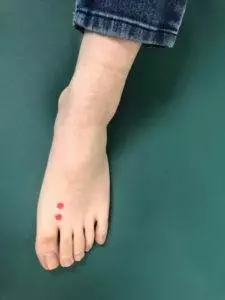
Acupuncture Near Me for Hepatitis in West LA
Chronic Hepatitis B and Hep C infections can be difficult to treat. Using acupuncture and herbs as an adjunct to conventional antiviral therapy for HBV may help to prevent further damage to the liver and improve organ function so that patients can recover from a chronic viral infection more fully. At Art of Wellness, we have over 30 years of experience providing integrative care for those suffering from chronic illnesses of all kinds.
*This article is for education from the perspective of Traditional Chinese Medicine only. The education provided by this article is not approved by FDA to diagnose, prevent, treat and cure human diseases. It should not stop you from consulting with your physician for your medical conditions. Traditional Chinese Medicine is based on Qi, which is an invisible force that usually cannot be observed by modern science. Because science focuses on testing ideas about the natural world with evidence obtained through observation, these aspects of acupuncture can’t be studied by science. Therefore acupuncture and Chinese herbs are often not supported by double-blind, randomized trials, and they are considered alternative medicine therapies in the United States.
How to Treat PMS With Acupuncture and TCM
By Xiaomei Cai, L.Ac., Ph.D. & Qineng Tan, L.Ac., Ph.D.
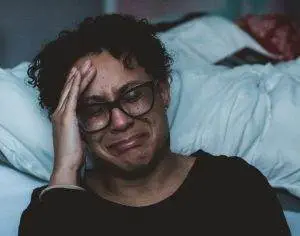
Monthly mood swings, bloated stomach, headaches, and weight gain. Why is PMS so bad? Premenstrual syndrome (PMS) is a set of symptoms that occur in the days before a woman gets her period. PMS symptoms affect every woman differently, and can be serious enough to disrupt your life every month. TCM is an effective way to deal with PMS, because acupuncture treatment can help relieve both physical and emotional symptoms of PMS and severe PMS, also known as PMDD (premenstrual dysphoric disorder).
To say that PMS is common among women is an understatement. The vast majority of women experience some changes in both their mental health and their bodies the week before their period starts. Whether or not a woman feels that it has a negative impact on her daily life may change over time. For some women, PMS isn’t a big deal; for others, it’s a major problem that can affect their relationships, impact their work, and make life hell every month.
Most women find their own particular pattern of PMS is somewhat predictable–until it isn’t. One of the most frustrating aspects of menstrual problems is the sense that things change without warning, and symptoms can come on suddenly with ferocious intensity. It can be difficult to describe how you feel before your period, because the symptoms seem to come and go. Some women find that their PMS symptoms are different from month to month. In some cases, they might find that every other month is bad, while the alternating months aren’t so bad. Why is PMS worse some months?
Other than the basic understanding that PMS is caused by fluctuations in hormones and brain chemistry, conventional medical science does not offer much in the way of clear answers about what causes PMS.
TCM provides a different framework for looking at menstrual problems and has been used to treat women’s health issues of all kinds for many centuries. TCM treatments including acupuncture, acupressure, moxibustion, and Chinese herbs can not only help relieve PMS symptoms, they can also be beneficial for other menstrual problems like irregular periods, PCOS, painful periods, endometriosis, heavy periods, fibroids, and symptoms of perimenopause.
Top 10 Symptoms of PMS
As a syndrome, PMS is considered a collection of symptoms that often appear together, in various combinations in different individuals. In the case of PMS, a woman may feel that her own symptoms change as often as every month, or gradually over the course of years. Girls in their teenage years may experience PMS in one way. Then, a woman in her early adult years may develop a different set of symptoms. After having a baby, a woman may find that her PMS symptoms have changed again. Then, many women in middle age experience changes in PMS symptoms as they go through perimenopause, approaching menopause. The most common signs of premenstrual syndrome include:
- Mood swings, low mood, feelings of sadness or anger
- Anxiety, feeling tense and irritable, cry easily or lose temper, want to be left alone
- Trouble sleeping, insomnia, disturbed sleep
- Breast tenderness, sore breasts, swollen breasts
- Food cravings, changes in appetite
- Weight gain, stomach bloating, water retention, pelvic pressure
- Gassiness, changes in digestion and elimination
- Acne, skin problems
- Changes in libido
- Headaches, migraines, difficulty concentrating, foggy head
Less obvious or well-known symptoms of PMS include: vision problems, tingling in the arms or legs, lack of coordination (clumsiness, dropping things), bruising easily, heart palpitations, dizziness, itchy skin, cold sores, toothaches, back pain, joint pain, and increased TMJ jaw pain.
Other health problems can be amplified during the premenstrual period, such as: chronic fatigue syndrome, fibromyalgia, interstitial cystitis, migraines, IBS, Meniere’s disease (dizziness, vertigo), clinical depression and anxiety disorders.
The physical and emotional aspects of PMS can affect each other, causing the typical mood swings. Feelings of sadness and frustration, or lack of sleep, may lead to comfort eating, but then the sight and sensation of your bloated stomach can cause you to feel depressed about your body. Minor problems with your spouse or co-workers can suddenly seem overwhelming and make you feel angry or helpless.
For some women, PMS symptoms are so bad that they feel unable to function the week before their period. Severe PMS is now diagnosed as PMDD.
What Is PMDD?
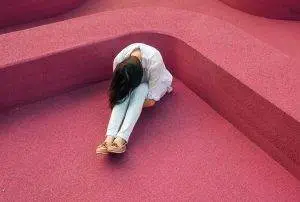
PMDD (premenstrual dysphoric disorder) is a severe form of PMS marked by intense emotional symptoms that dramatically impact a woman’s life, in addition to physical symptoms. “Dysphoria” is the opposite of “euphoria;” in other words, it is a mental state characterized by profound unhappiness and negative feelings. It is estimated that about 5% of all women experience this extreme type of PMS. Signs of PMDD include:
- Severe anxiety, panic attacks, paranoia
- Severe depression, in some cases even suicidal thoughts, lack of self-worth
- Anger and irritability that provokes rage and causes conflicts with other people
- Fatigue, low energy, inability to concentrate, feelings of confusion
- Intense food cravings, possibly leading to binge eating
Again, there is currently no scientific answer for what causes PMDD, although it is generally believed to be related to the way estrogen levels and progesterone levels change between ovulation and the onset of the menstrual period. Mood is considered to be related to serotonin levels in the brain, and this is why PMDD is usually treated with birth control pills, which suppress ovulation, and/or antidepressants (SSRIs), which affect serotonin uptake.
Medical Treatment for PMS
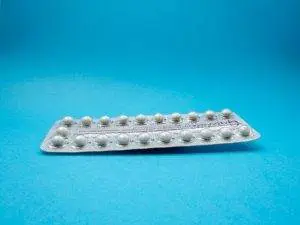
Naturally, when a woman asks for advice about PMS or PMDD, she is going to hear suggestions like: “try meditating, exercise more, eat a healthy diet, and get more sleep.” And it is true that making good lifestyle choices is an important part of helping to reduce PMS symptoms. But women who are suffering with serious PMS need solutions beyond these kinds of lifestyle guidelines.
When women complain of PMS symptoms, doctors will most often recommend OTC pain medications like ibuprofen or acetaminophen (NSAIDs) to relieve pain. Diuretics may be used to relieve bloating or premenstrual weight gain. Of course, most commonly, women are prescribed oral birth control pills, which suppress ovulation, and therefore may reduce the severity of PMS symptoms. More and more frequently, women may be prescribed antidepressants to try to deal with emotional symptoms and mood swings, or anxiety medications to take as needed during PMS. In effect, doctors often treat PMS the same way they would depression or anxiety.
Clearly, birth control pills are not helpful for women who may want to get pregnant, and some women may be concerned about how taking the pill or antidepressants may affect their fertility in the future. None of these pharmacological solutions for PMS address the root cause of the symptoms, and all of these medications carry side effects that may impact a woman’s overall health. Health care for women with TCM seeks to address the deeper internal causes of hormonal imbalances and other problems with the organ systems that are impacting the health of the ovaries and the regularity of the menstrual cycle.
Can Acupuncture Help PMS?

While it is only in recent years that conventional medicine has begun to acknowledge connections between physical health and emotional health, TCM has understood for many hundreds of years that health conditions of all kinds, especially those related to the menstrual cycle, are rooted in the balance of energies. Menstruation represents an ongoing process of transformation that occurs not only within the reproductive organs, but which affects every part of a woman, and even the people around her.
The concept of Yin and Yang in Chinese philosophy describes two opposing yet complementary forces that are constantly acting upon each other in order to achieve balance. The menstrual cycle is very much based on Yin and Yang energies; during the follicular phase of the cycle (before ovulation), Yin is increasing while Yang is decreasing, and in the luteal phase (after ovulation, before the period), Yang is increasing while Yin is decreasing. The system is designed, naturally, to create the right conditions for conception; this process of Yin and Yang exchange is what determines a woman’s fertility.
While the health of the uterus and ovaries is definitely central to the process, within the TCM philosophy, they are not the only organs involved with menstruation. The Kidneys, Liver, and Heart all have important roles to play, as well. In TCM, we also view the elements of Fire–to provide warmth, controlled by the Heart–and Water, controlled by the Kidneys–to provide moisture, as being vital to all processes within the body, especially to menstruation. Blood is cleansed, stored, and then distributed to the other organs by the Liver. Blood being central to the process of menstruation, the Liver’s role is really key in how the whole thing plays out.
According to TCM theory, most PMS and PMDD symptoms are caused by problems with Liver Qi. When the Liver Qi is out of balance, it can lead to feelings of anger, frustration, depression, and irritability. The Liver system is particularly susceptible to negative effects of stress.
There are a few different variations of Liver Qi imbalance and other patterns that can contribute to PMS symptoms:
- Liver Qi invasion – This is a condition of excess, in which there is too much rising Liver Qi, characterized by overall negative emotions that are disruptive, including anger and anxiety, breast tenderness, headaches, dizziness, and constipation.
- Liver Qi depression – In this case, there is not enough Liver Qi, causing feelings of sadness, heaviness in chest, painful swelling of breasts, sighing, bloated stomach, lack of appetite, cramping during period, scanty blood during period.
- Spleen Kidney deficiency – In this case, stagnant energy in the Kidney system is preventing water from moving appropriately, causing water retention or edema.
From the scientific medical standpoint, acupuncture treatment has been shown to have a positive effect on neurotransmitters like serotonin, and to impact levels of estrogen and progesterone. This happens naturally because we are using TCM methods to restore optimal function of all the organs. With Chinese herbs we are able to get specific nutrients into the body that we cannot get from the foods we normally eat.
Acupuncture treatment accompanied with specific herbs for PMS patterns can help balance the liver Qi, and bring all of the organs into synergistic harmony.
In order to make lasting change, it is best to have acupuncture treatment at least once or twice a week. We need to deal with each phase of the menstrual cycle as it occurs by tailoring the acupuncture treatment and herbs to your PMS and period symptoms.
A systematic review of ten controlled trials using acupuncture to treat PMS concluded that TCM treatment of PMS significantly improved symptoms.
Top 3 Tips for PMS Relief From TCM Perspective

There are still a lot of taboos surrounding women’s health, and many girls and women have never learned how to take care of their reproductive health. Working with an experienced TCM doctor will enable you to get personalized care and advice about how to eat the best diet for PMS symptoms, what activities to avoid before your period, and other female hygiene tips that you may not have heard before.
- Nutrition – conventional Western thinking about healthy eating currently focuses on eating fresh, whole foods, which is good, except that people tend to think this means eating a lot of foods raw or cold, as in salads and smoothies. According to the TCM philosophy of nutrition, though, eating cold foods is actually one of the worst things you can do when it comes to relieving PMS and painful periods. Putting a lot of cold food into the stomach cools down the temperature of the other internal organs, which can contribute to more cramping and worse cramps. During the week before your period, concentrate on eating plenty of nourishing, cooked foods like soups and stews, proteins and vegetables, and whole grains like brown rice and quinoa. Avoid too much dairy, sugar, caffeine, hot, spicy or fried foods (that includes chips and crackers), and definitely avoid icy cold beverages and frozen treats.
- Keep track of your period – there are many apps available now to help with this, but it can also be a simple chart with room for notes about your symptoms. Keeping track of your PMS symptoms every month can help you recognize patterns in your own behaviors and experiences. A record of PMS symptoms will also help you communicate what you’re feeling to your health care providers when you are seeking treatment for PMS or PMDD.
- Exercise – gentle movement modalities that move Qi through the body are great to help PMS: Tai Qi, yoga, or dancing are all good. Avoid deep twists that could squeeze or put pressure on the ovaries and other organs. Again, keep track of your exercise routines and how they affect your physical and emotional wellbeing from month to month so that you can see which type of workout is best for you, or if some types of exercise make PMS worse.
Acupuncture Near Me for PMS in Los Angeles, CA
Many women come to us at Art of Wellness seeking help with menstrual problems or fertility issues. We have over 30 years of experience in helping to relieve symptoms of PMS and all types of period pain and dysfunction. It is possible for the menstrual cycle to flow without extreme feelings or strong physical discomfort. If you feel like PMS or PMDD is negatively impacting your life every month, please do not hesitate to give us a call.
*This article is for education from the perspective of Traditional Chinese Medicine only. The education provided by this article is not approved by FDA to diagnose, prevent, treat and cure human diseases. It should not stop you from consulting with your physician for your medical conditions. Traditional Chinese Medicine is based on Qi, which is an invisible force that usually cannot be observed by modern science. Because science focuses on testing ideas about the natural world with evidence obtained through observation, these aspects of acupuncture can’t be studied by science. Therefore acupuncture and Chinese herbs are often not supported by double-blind, randomized trials, and they are considered alternative medicine therapies in the United States.
How to Treat UTI With Acupuncture and TCM
By Qineng Tan, L.Ac., Ph.D. & Xiaomei Cai, L.Ac., Ph.D.
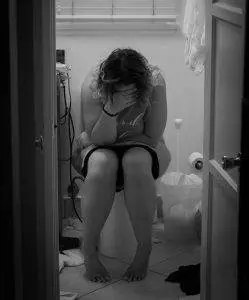
Why do I feel like I have to pee all the time? A urinary tract infection, usually referred to as UTI, is a bacterial infection that affects the bladder and/or other parts of the urinary system, causing urinary urgency, often accompanied by a burning pain when you go to the bathroom. Acupuncture and TCM is a good way to get to the root causes of frequent urination, including recurrent UTIs.
Urinary frequency, or an unusual urgency to urinate, can be caused by several different health conditions. A common cause of bladder pain, pressure on the bladder, or a burning sensation when peeing is a bacterial infection in the urinary tract, or UTI. But there can be many other reasons for constantly feeling like you have to pee, including diabetes, interstitial cystitis (IC), pregnancy, prostate problems, ovarian cysts, and more.
Over half of all adult women have experienced a UTI (also called cystitis) at some point in their lives. Many women get UTIs frequently, making them the most common type of non-hospital-related infection in the U.S. Up to 6% of all doctor visits are related to UTIs. A UTI can occur when bacteria, usually E. coli, gets into the urethra and travels up into the bladder, or further into the urinary tract. This can happen because of hygiene habits, after sex or exercising, or the use of contraceptives or period products. It can also happen when urine sits in the bladder for too long, or because a person has a weakened immune system.
While UTI treatment at home remedies such as drinking cranberry juice are popular, most women recognize that once they get that constant urge to pee, they have no choice but to rush to the doctor for antibiotics. Typical UTI medical treatment almost always involves confirming the infection by lab analysis, and a prescribed course of antibiotics, along with analgesic medicine (such as Pyridium) to help the UTI pain in bladder. Unfortunately, many women keep getting UTIs. Infections that are antibiotic resistant are increasingly common, and antibiotics do not get to the root of the problem.
Interstitial cystitis (IC), or painful bladder syndrome, is a condition that causes a constant sensation of having to pee, or bladder pressure, even when there is no infection present. Recurrent UTI and IC are a significant source of anxiety and depression for women, as they can cause almost constant pain and an inability to leave the house due to the constant urge to urinate.
UTI in men is not as common as UTI in women. The more common cause of frequent urination in men is benign prostatic hyperplasia (BPH), in which an enlarged prostate presses on the urinary organs, blocking the flow of urine, and causing backup that can lead to bacterial urinary tract infection men.
Sometimes what feels like a UTI might be something else. Growths in the pelvic area, such as ovarian cysts, uterine fibroids, or tumors can cause pressure in the bladder, bladder pain, or urinary frequency at night. Even when there is no infection, there may urinary symptoms such as:
- Strong urge to pee frequently (more than 8 times per day)
- Difficulty urinating
- Urine is different color than usual
- Pain during peeing, or burning sensation when peeing
- Nocturia, frequent urination at night
The conventional medicine answer to UTI is antibiotic treatment, but this is not the only answer for everyone. TCM methods of acupuncture and herbs can help with improving the function of bladder and kidney systems, reducing symptoms from recurrent UTIs, as well as helping to address the deeper problems that cause inflammation and pressure in the bladder.
Top 10 Urinary Frequency Causes
There are many possible causes of frequent urination.
- UTI (urinary tract infection, also called cystitis, or bladder infection)
- Kidney infection – when bacteria move further up into the urinary tract, the kidneys can become infected. Sometimes people with nerve damage in the spine cannot feel UTI symptoms (neurogenic bladder), so the infection becomes more widespread.
- Bladder stones – when the bladder does not empty completely, urine can crystallize and form hard stones, causing pain during urination.
- Interstitial cystitis (painful bladder syndrome) – a syndrome of urinary pain symptoms, the exact cause of which is unknown. Inflammation of the bladder lining may be due to trauma (from surgery or delivery/birth), overdistension, or dysfunction of the pelvic floor muscles.
- Prostatitis – inflammation of the prostate accompanied by irritation of the nerves in the area; not necessarily an infection, although a bacterial infection of the prostate can occur.
- Urinary incontinence – leakage of urine, occurs when the urethral sphincter that controls the flow and stoppage of urine is weak. More common in women and older people.
- Vaginitis – inflammation of the vagina, usually due to infection. Candida, or yeast infection, is one type of vaginitis.
- Diabetes – can cause a variety of urinary problems, due to the body producing more urine to process blood sugar, and nerve damage that leads to urinary retention and incontinence. Constant thirst is also a sign of diabetic urinary symptoms.
- Side effects of cancer treatment in pelvic area – cancer treatments that affect the pelvis, including radiation, chemotherapy, immunotherapy, and surgeries to remove pelvic organs, can all cause irritation or damage to the bladder.
- Overactive bladder (OAB) – a group of symptoms, including frequent urination, leakage, nocturia (getting up to pee at night), and primarily, a strong urge to urinate often. Considered to be caused by inappropriate signalling of the nerves that communicate between the brain and the urinary tract organs.

Causes of frequent urination vary somewhat according to biological sex. Frequent urination in men is often caused by prostate problems, while frequent urination in women may be due to pregnancy or other womens’ health conditions related to the ovaries or uterus.
Pressure on the bladder because of pregnancy, or from other organs, can also cause urinary frequency and discomfort. This can happen due to an anterior prolapse, when the pelvic floor is weakened, and the uterus, intestine, or bladder drop from their normal position. When a woman is pregnant, the heavy uterus often causes more frequent urination, or, in some cases, urinary retention. Damage or trauma to the pelvic floor can occur during delivery, so many women experience weak pelvic floor muscles, prolapsed uterus or bladder, and ongoing urinary urgency after they have had a baby.
In men, an enlarged prostate or prostatitis (infection and inflammation of the prostate) can put pressure on the bladder and other parts of the urinary system.
A frequent need to pee can also be caused by drinking too much coffee or alcohol, or taking diuretics.
Can Acupuncture Help Frequent Urination?
In Chinese Medicine, urinary problems come under the classification of “Lin Syndromes.” Lin disorders generally involve painful, “dribbling” urination and are caused by disharmonies in the Bladder and Kidneys, as well as involving other major organs like the Heart, Liver, and Spleen. Dampness and Heat are the primary pathogenic factors, so we use acupuncture treatment and herbal formulations to clear heat and dampness from the body.
Top 5 TCM differentiations of UTI:
- Damp Heat – characterized by frequent urination, burning sensation when peeing, painful pressure in bladder, dark urine or cloudy urine that smells unusual, feelings of nausea, bitter taste in mouth
- Heart Fire – frequency and urgency, thirst, hot, red face and chest, trouble sleeping/insomnia, irritability, anxiety, heart palpitations
- Liver Fire – excess heat causes painful burning during urination, headaches, ringing in ears/tinnitus, constipation, feelings of anger and frustration, redness in eyes and face.
- Fatigue Lin – covers urinary disorders that involve incomplete emptying of the bladder, due to prostate enlargement or prolapsed pelvic organs.
- Stone Lin – obstructions of the urinary system due to buildup of minerals that create stones in the bladder, kidney stones, etc.
Patients who have problems with recurring UTIs may be resistant to the antibiotics they’ve been given. TCM herbs can be used as an additional or alternative remedy from antibiotics and help to strengthen the immune system overall. One review of studies involving the use of Chinese herbal medicine (CHM) for UTIs concluded that the herbs, whether used alone or in conjunction with antibiotics, worked better than antibiotics alone.
One study showed that women who were prone to getting UTIs who were treated with acupuncture as preventative care only got a UTI one-third as often as women who didn’t receive acupuncture. Acupuncture has also been shown to be highly effective for bladder pain due to interstitial cystitis. Studies have also shown that TCM treatment can relieve the blockage of urine caused by an enlarged prostate (BPH).
Top 5 Tips for Preventing UTI

What a relief! Now that you’ve gotten over that urinary tract infection, it’s important to take steps to prevent getting another UTI. Here are some natural ways to prevent UTIs:
- Drink more water – This may seem counterintuitive, as you don’t want to have to pee even more. But you do want to be constantly flushing bacteria out of the urinary tract. Avoid drinks like coffee and soda, which can be irritating to the bladder.
- Go when you feel you need to – Some therapies for overactive bladder or IC involve training yourself to hold urine, but for most people, this is not a good idea. Retaining urine for too long contributes to bacterial growth and causes overdistension of the bladder.
- Hygiene – be sure to wipe from front to back when you go to the bathroom. Change clothes and underwear often, especially after sweating. During your menstrual period, change your pad and tampon frequently.
- After sex – always go to the bathroom and urinate before falling asleep.
- Avoid chemical products – Avoid using deodorants, douches, or scented wipes around the genital area. Consider whether contraceptive products like spermicides might also be part of the problem.
Acupuncture Near Me for UTI
While it is rare for a UTI to become so serious that you have a fever or become nauseated, urinary problems should be taken seriously before they become worse. If your UTIs keep coming back, or you constantly feel like you have to pee, it may be a sign that there is something deeper going on. As people age, urge incontinence, prolapsed organs due to weak pelvic floor muscles, and nerve damage can lead to more serious bladder problems. TCM provides a holistic way to treat urinary tract issues, as well as other, possibly hidden conditions in the pelvic region. Urinary urgency may be a signal of something else, so don’t ignore it. Consult with your acupuncturist to find urinary frequency relief.
*This article is for education from the perspective of Traditional Chinese Medicine only. The education provided by this article is not approved by FDA to diagnose, prevent, treat and cure human diseases. It should not stop you from consulting with your physician for your medical conditions. Traditional Chinese Medicine is based on Qi, which is an invisible force that usually cannot be observed by modern science. Because science focuses on testing ideas about the natural world with evidence obtained through observation, these aspects of acupuncture can’t be studied by science. Therefore acupuncture and Chinese herbs are often not supported by double-blind, randomized trials, and they are considered alternative medicine therapies in the United States.
How to Stop Snoring With Acupuncture and TCM
By Qineng Tan, L.Ac., Ph.D. & Xiaomei Cai, L.Ac., Ph.D.
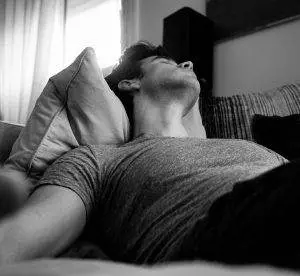
Have you been told you’re snoring loudly? Do you feel tired even after 8 hours of sleep? Waking up with a dry mouth, feeling tired all the time, and having trouble staying asleep at night are all signs that you might have sleep apnea. Sleep apnea is a sleeping disorder in which normal breathing is interrupted repeatedly. Acupuncture and TCM offer a natural way to treat obstructive sleep apnea, insomnia, fatigue, and other sleep-related problems.
Sleep Apnea (also known as sleep apnoea) is when a person does not breathe normally during sleep. When there is a pause in normal breathing during the night, the body is not getting enough oxygen, and the brain sends an urgent message to start breathing again. The person wakes, so briefly that they usually do not remember it, gasps for air and starts breathing again. Often people do not realize that they are snoring or making snorting or choking sounds while they sleep unless another person tells them it’s happening. Because of this, many cases of sleep apnea go undiagnosed, and people go on feeling fatigued all the time.
While people of any age or gender can experience sleep apnea, it is most common among older men. There are a few different kinds of sleep apnea; the most prevalent type is obstructive sleep apnea (OSA), in which the throat and/or airway is physically obstructed by the positioning of the neck, jaw, and soft tissues of the throat, like the tongue and uvula. OSA is associated with being overweight or obese, because extra weight can affect the musculature of the upper respiratory system. Women who have already gone through menopause are more likely to develop sleep apnea because postmenopausal weight gain is more likely to occur in the upper body than it does prior to menopause. Sleep problems and obesity are related in many ways; getting less sleep or poor quality sleep can cause people to gain weight or have trouble losing weight. People with diabetes and/or metabolic syndrome are also at higher risk for obstructive sleep apnea.
Besides disturbing sleep and causing fatigue, apnea can lead to other serious health conditions, especially cardiovascular problems like high blood pressure, irregular heartbeat, and stroke. Sleep apnea can increase the heart rate and the production of stress hormones. Men with OSA are more likely to experience erectile dysfunction (ED). Lack of quality sleep can also have a negative impact on mental health, contributing to depression, anxiety, and cognitive decline.
The typical treatment for snoring involves the use of a sleep apnea machine, called a CPAP machine (continuous positive air pressure machine), which pushes air into the nose while you sleep, ensuring that the airway stays open and continuously active. This treatment can help people breathe easier throughout the night, but some people may find the machine noisy and uncomfortable.
TCM methods like acupuncture treatment for snoring and sleep apnea offer a way to address these problems at their source holistically, helping people to sleep well and breathe more freely.
Top 3 Types of Sleep Apnea
Sleep apnea causes loss of oxygen due to shallow breathing (hypopnea) and/or interrupted breathing while sleeping. Different types of sleep apnea are classified by their physiological causes:
- Obstructive sleep apnea (OSA) – this is caused by the improper relaxation of the throat muscles while sleeping.
- Central sleep apnea (CSA) – is caused by disordered signalling from the brain to the organs that control breathing.
- Complex sleep apnea – (or treatment emergent sleep apnea) is a combination of both of the above.
Restless legs syndrome (RLS), also known as Willis-Ekbom disease, is a condition wherein a person has an uncontrollable urge to move the legs, or sometimes arms or other parts of the body, accompanied by a sensation of itching, burning, crawling or throbbing. This usually happens when the person is lying in bed, trying to fall asleep. Restless leg syndrome can coexist with OSA, compounding the problem by making it difficult to get to sleep or stay asleep during the night.
Narcolepsy is a sleeping disorder in which overwhelming sleepiness during the daytime causes people to suddenly and uncontrollably fall asleep. Many people who suffer from narcolepsy also have sleep apnea. In this case, the sleep problem is not related to breathing so much as how the brain and body are moving through sleep cycles, like REM sleep. For people who have narcolepsy, treatment with a CPAP machine is often not very helpful.
Sleep apnea or snoring does not seem to be related to other abnormal sleeping behaviors (parasomnia), such as sleepwalking, night terrors, or sleep-related eating.
Top 10 Symptoms of Sleep Apnea
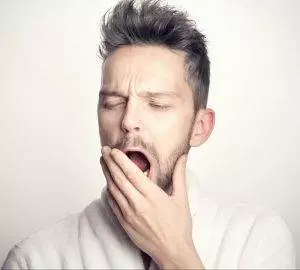
Many people snore and do not realize it. It is important to pay attention to the subtler sleep apnea symptoms. Signs of sleep apnea include:
- Loud snoring
- Interrupted breathing – moments during the night when the person’s breathing actually stops and then starts again
- Gasping for air while sleeping
- Waking up with a dry mouth or sore throat
- Headaches in the morning
- Insomnia, difficulty getting to sleep or staying asleep during the night
- Feeling very sleepy during the daytime (hypersomnia)
- Difficulty paying attention
- Feeling irritable
- Getting up often during the night to urinate (nocturia)
What Causes Snoring?
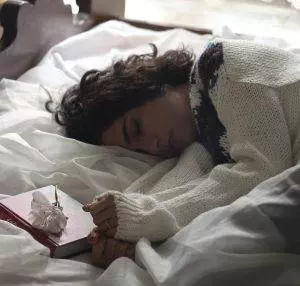
Sleep apnea is caused either by a physical obstruction of the throat and airways or by problems with brain signals to the breathing apparatus. Not everyone who has sleep apnea snores loudly. On the other hand, not everyone who snores necessarily has sleep apnea. Other reasons people snore may include:
- Congestion of the nose due to a cold or allergies
- In late pregnancy, the growing belly puts upward pressure on the respiratory system
- Sleeping pills, medications that work as relaxants, like Ativan or Valium
- Alcohol consumption
- Anatomy – large tongue or uvula, or swollen tonsils
People with sleep apnea are often advised to sleep on their side rather than on their back, as this helps prevent the obstruction, but it can be difficult for people to control their behavior while sleeping.
Treatment for Sleep Apnea
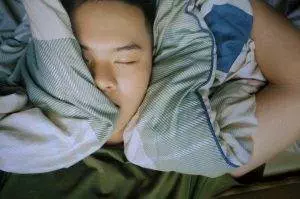
To firmly establish whether a person has sleep apnea, and what type, doctors will often evaluate the situation in a sleep study session. People will spend the night in a sleep center, where their heart and breathing functions are monitored (polysomnography).
CPAP machines are generally considered to be the best care available for sleep apnea. These devices can help stop snoring, allow a person to get more restful sleep, and cut the risks of serious issues like heart disease that are associated with sleep apnea. However, the machine does not actually do anything to improve the weak musculature that causes OSA or the disordered signalling that causes CSA. It is possible to swallow air while breathing with the CPAP machine, which can lead to gas and a bloated stomach. Some people may find the face mask, which must be strapped to the face, uncomfortable. The noise of the machine may be disturbing to the person using it, as well as to the person’s bed partner. It may be difficult for some patients to get used to using the machine, and if they are not using it regularly, they are not getting the health benefits.
There are also some oral appliances available, such as mandibular advancement devices (MAD), which are worn in the mouth to alter the placement of the jaw and tongue in order to keep the airway open during sleep. These can also be effective in terms of helping people breathe better while they sleep. Compared to CPAP, they are quiet, discreet, and cost-effective. Again, the main question is whether a person will be able to tolerate the device; some people may experience toothache or dental pain, TMJ jaw pain, dry mouth, or too much saliva.
Surgery for snoring and sleep apnea is usually only recommended if other methods of treatment have failed. Different procedures involve removing soft tissues (uvula, tonsils, adenoids), or changing the shape of the jaw bones. Small rods may be inserted into the upper palate to help keep the airway open. A device that monitors breathing and stimulates movement of the tongue may be implanted in the chest.
Sometimes people may use melatonin as a natural sleep aid. Melatonin may have a positive impact in terms of helping people fall asleep more easily. It also has strong antioxidant properties, which means it may help with the control of the breathing apparatus and the amount of oxidation a person is getting while sleeping. While it is generally considered safe as a health supplement, melatonin side effects can include problems with dizziness, headaches, and nausea, and it can also be contraindicated with other medications. Melatonin can affect blood coagulation, so it may be unsafe to take if a person is also taking blood thinners, for example.
Can Acupuncture Help Stop Snoring?
According to TCM theory, the spleen and stomach are responsible for transforming nutrients from food and fluids into Qi (life energy), which is then delivered to the heart and lungs. In the TCM view, sleep apnea is often a problem related to phlegm and Qi stagnation, as are many conditions related to fatigue or insomnia. If phlegm builds up and becomes stagnant in the spleen, the lungs cannot get the Qi they need. So, one possible differentiation for sleep apnea is Spleen Deficiency with Qi Stagnation. This condition of dampness and phlegm will often cause people to feel heavy and bloated.
In some cases, too much internal heat contributes to the problem. Snoring, combined with sweating, and waking up with a sore throat, is a sign that we need to clear heat and toxicity from the body.
Sleep disturbed by nightmares is associated with the gallbladder, while difficulty falling asleep is associated with the liver. An acupuncture practitioner will listen carefully to what specific symptoms of sleep apnea each individual patient is experiencing, and tailor the treatment accordingly.
A meta-analysis of over 200 randomized trials involving the use of acupuncture to treat sleep apnea concluded that acupuncture was more effective overall than CPAP treatment, in terms of improving breathing and oxygen levels.
Can Chinese herbs help snoring and sleep apnea? Specific herbs have been shown to help reduce inflammation and improve oxygen levels in patients with sleep apnea. Chinese herbal formulations can help stop snoring and reduce daytime fatigue.
Natural Remedies for Snoring

Acupressure can help snoring and sleep apnea. Since we are trying to clear heat and phlegm from the stomach, spleen, and large intestine, use acupressure points along the Stomach Meridian, which runs down the leg. On the front of the shin, apply pressure, kneading with your thumb, starting to the side of the shin bone a few inches below the knee, then moving down about 3 inches and doing the same thing. Knead each of the four points about 30 times as your move down the leg. If you are aware that one side of the nose is more blocked than the other while you are breathing during the night, practice the acupressure on the opposite leg. For example, if your left nostril is the one that is more stuffed up, do acupressure on the right leg.
Acupuncture Near Me for Snoring
As the population ages, and unfortunately, more people suffer from obesity and metabolic syndrome, sleep apnea is a growing health concern all over the world. Snoring can have a seriously negative impact on quality of life, health, and longevity. Conventional methods of treatment for sleep apnea can be effective, but many people find CPAP uncomfortable and inconvenient for long-term use. If you suspect you may have sleep apnea, or are worried because your partner snores loudly at night and seems to be gasping for air, do not wait to get help. Acupuncture and TCM herbs can help relieve fatigue due to snoring and reduce the risk of more serious problems related to sleep apnea.
*This article is for education from the perspective of Traditional Chinese Medicine only. The education provided by this article is not approved by FDA to diagnose, prevent, treat and cure human diseases. It should not stop you from consulting with your physician for your medical conditions. Traditional Chinese Medicine is based on Qi, which is an invisible force that usually cannot be observed by modern science. Because science focuses on testing ideas about the natural world with evidence obtained through observation, these aspects of acupuncture can’t be studied by science. Therefore acupuncture and Chinese herbs are often not supported by double-blind, randomized trials, and they are considered alternative medicine therapies in the United States.
How to Treat Musculoskeletal Pain With Acupuncture and TCM
By Qineng Tan, L.Ac., Ph.D. & Xiaomei Cai, L.Ac., Ph.D.

Do you experience unexplained pain all over the body? Muscle pain and tenderness, along with feeling tired all the time and having mood issues? Widespread musculoskeletal pain accompanied by fatigue or feeling exhausted may be a sign you have fibromyalgia. Alternative medicine methods like Acupuncture and TCM offer a way to help ease the chronic pain, sleep problems, and emotional disturbances caused by fibromyalgia.
Fibromyalgia (sometimes referred to as “fibro” or FM) is one of the most common chronic pain conditions worldwide, affecting an estimated 10 million people in the United States alone. Still, this chronic condition is still not well understood by medical science. There are no definitive tests to show whether or not fibromyalgia is the cause of pain all over the body along with chronic fatigue, so many people go on having musculoskeletal problems and hurting all over without being diagnosed or treated. There are many people who have fibromyalgia who also suffer from depression and anxiety related to the illness. Fibromyalgia can dramatically impact a person’s quality of life. While people of ages and genders can have fibromyalgia, it is much more prevalent among women.
Fibromyalgia is considered to be a syndrome: a collection of symptoms that often occur together. Fibromyalgia is associated with other conditions like lupus, rheumatoid arthritis (RA), myofascial pain syndrome, and myalgic encephalomyelitis/chronic fatigue syndrome (ME/CFS). It may coexist with these other chronic conditions, or sometimes be mistaken for one of them. However, fibromyalgia is now understood by medical professionals to be its own distinct condition with specific manifestations.
People who have RA have been shown to have an increased risk for also having fibromyalgia. But the quality and location of the musculoskeletal pain differentiates the two conditions. The pain of fibromyalgia shows up in the musculoskeletal system in the areas where there are large muscles, causing pain that may move around throughout the torso, back, hips, thighs and arms. Fibromyalgia pain is often described as a kind of “tenderness,” or when the body aches all over. “Tender points” all over the body are specific to fibromyalgia. This is different from arthritis, which generally causes swelling and pain in the joints. Both RA and lupus are understood to be caused by inflammation, while fibromyalgia is believed to be caused by a problem with the central nervous system (CNS), in which pain signals are amplified, causing extreme sensitivity and pain, even when there is no seeming reason for that area of the body to feel pain.
Some of the fibromyalgia symptoms are very similar to those of myalgic encephalomyelitis (ME), which is also known as chronic fatigue (CFS). As with RA and lupus, the two conditions can overlap. The difference is that the overwhelming symptoms of ME/CFS are related to fatigue or post-exertional malaise (PEM), while the predominant symptom of fibromyalgia is widespread muscle pain and tenderness.
Fibromyalgia seems to show up in some people due to a traumatic or triggering event. There can then be a fibromyalgia flare up due to the presence of other triggers later.
Fortunately, acupuncture, herbs, and other forms of alternative medicine that fall under TCM can approach all of the different symptoms of fibromyalgia holistically. Acupuncture is widely accepted to be effective for helping musculoskeletal conditions of all kinds, as well as neurological problems, rheumatological conditions, sleep issues, and emotional and mental health disorders.
Top 10 Symptoms of Musculoskeletal Pain
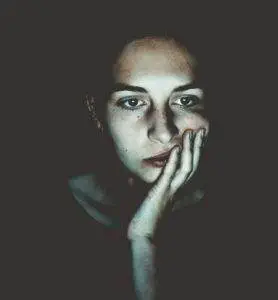
As a syndrome, fibromyalgia may manifest as any combination of a few or several of a variety of symptoms. The most common symptoms of fibromyalgia include:
- Widespread musculoskeletal pain: pain, tenderness, and/or stiffness in the muscles all over the body that may come and go or migrate from one area to another
- Fatigue, exhaustion, extreme tiredness
- Emotional and/or mental issues: depression, anxiety, PTSD
- Sleep problems, insomnia
- Cognitive issues: difficulty concentrating, memory problems, “fibro fog”
- Headaches, migraines
- Neuropathy: tingling or numbness in the hands and/or feet
- TMJ, jaw pain
- Digestive problems: irritable bowel syndrome (IBS), abdominal pain, bloating
- Bladder pain, interstitial cystitis
Other more subtle signs of fibromyalgia can include: itching all over, a skin crawling sensation (like bugs crawling on skin), extra sensitivity to smells or temperature, a tendency to shiver, or dry eyes or eye pain.
Top 5 Causes Musculoskeletal Pain Flares
The symptoms of fibromyalgia tend to come and go. Some days a person might feel almost totally fine, then other days, the fibromyalgia flares, causing more pain, exhaustion, and sometimes other symptoms. What triggers a fibromyalgia flare up?
- Hormonal changes during menstrual cycle, miscarriage, pregnancy, or postpartum
- Prolonged stress
- A sudden traumatic event, PTSD trigger, panic attack
- Changes in weather: temperature, humidity, barometric pressure
- Lack of sleep
When one of the 18 tender points of fibromyalgia is touched, it can trigger more widespread pain. These points include areas like: the front and sides of the neck, the base of the skull, the elbow, and the backs of the knees.
What Is the Treatment for Fibromyalgia?
Medical treatment for fibromyalgia typically involves a combination of medicine to alleviate pain with psychological support and lifestyle management. Drugs like Lyrica, Cymbalta, and Savella are approved for prescription for patients with fibromyalgia. Lyrica and Cymbalta are also used to treat conditions that involve nerve damage or nerve pain, like diabetes, neuropathy, shingles, while Savella works in a way that is similar to antidepressants. Other pain relievers and/or antidepressant medications may also be prescribed to help people manage pain of fibromyalgia, help them sleep better, and boost mood. All of these medications can come with unwanted side effects, and they do not help to relieve pain in every case.
People with FM pain will often receive counseling on how to manage their condition by being very careful not to exert themselves or become exhausted. Getting quality sleep and reducing stress can help to prevent fibro flare up. It can be hard for people to follow guidelines that ask them to make major lifestyle changes. Fortunately, acupuncture, herbs, and the patient support of a TCM practitioner can offer more help for people with fibromyalgia.
Acupuncture for Musculoskeletal Pain
Can acupuncture help fibromyalgia? Yes. TCM offers a comprehensive system for managing musculoskeletal pain and chronic pain, helping to heal nerve damage and restore central nervous system function, supporting mental health, relieving anxiety and depression, and addressing sleep problems. Whereas with conventional medicine, a patient might go from one doctor to another to handle all of these issues, the acupuncturist can address them all at once. The TCM point of view always takes into consideration the connection between what is going on physically with what is going on emotionally in each individual, so it is really an excellent way to help patients with fibromyalgia.

Like Western medicine, TCM recognizes that sometimes fibromyalgia can be originally caused by a traumatic event or an extremely stressful time in one’s life. Emotional upheavals cause stress to the liver, which in turn causes stagnation of blood and Qi. TCM also sees coldness and dampness as pathogenic forces that can have a profound effect on overall health. According to TCM, widespread musculoskeletal pain falls under the category of Bi Syndrome. In Bi Syndromes, cold and damp get into the body and take hold on a deep level, causing pain and stiffness. With acupuncture treatment for fibromyalgia, we seek to clear cold and damp, and restore good flow of Qi and blood throughout the body.
Acupuncture has an analgesic effect, relieving muscle pain without side effects. Moxibustion may be utilized to bring warmth to areas of the body. Cupping is another modality used to draw out damp cold and improve blood flow. Tai Qi and Qi Gong, gentle therapeutic movement practices that have been developed over 1000s of years as part of TCM, also may offer great benefits for people with FM.
A systematic review of over 400 studies of fibromyalgia treatment with TCM, acupuncture treatment was found to be effective for reducing both short term pain and long term pain.
Another review found that acupuncture and herbs worked better to reduce pain than standard medication therapy.
Top 5 Tips for Managing Fibromyalgia
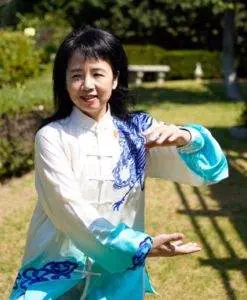
Dealing with fibromyalgia and seeing significant improvement in fibro pain will probably involve making some lasting lifestyle changes. Making adjustments to your sleep habits, food choices, and your exercise routine can make a difference in preventing the next FM flare up.
- Choose a gentle, enjoyable form of exercise. Start slowly, and gradually increase the amount you can exercise over time. Walking outdoors is a great option, as are Tai Qi and Qi Gong.
- Limit or eliminate caffeine and alcohol. These substances can interfere with getting good sleep and exacerbate liver problems. Alcohol is not safe to consume if you are taking medications for fibromyalgia like Lyrica, Cymbalta, and Savella.
- Avoid sugar, which may give you a short-lived good feeling, but will lead to a “sugar crash,” and feeling more exhausted than before. Any kind of simple carbohydrates, like foods made of white flour, or bottled fruit juices, can cause highs and lows in blood sugar. Avoid sugar substitutes and food additives like MSG, which can trigger reactions in some people.
- Focus on eating complex carbohydrates, especially vegetables. These help you have a more sustained energy throughout the day. Nuts and seeds are also good.
- Warm baths with Epsom salts can be very soothing.
Getting enough sleep at night, and even resting or napping during the day, may be essential to your well-being if you have fibromyalgia. Develop habits that allow for plenty of rest and set yourself up for a good night’s sleep.
Acupuncture Near Me for Musculoskeletal Pain
Many people who have fibromyalgia choose to try alternative medicine as a way of managing FM pain. Physiological conditions that stem from emotional stress are often not resolved through the use of medications. Acupuncture and TCM have a long history of helping people to heal from emotional disturbances that cause physical pain. Acupuncture treatment works to increase the flow of energy through the body and improve the connections between the brain and nerve endings. If you or someone you know suffers with fibro, consider acupuncture as a way to find relief from musculoskeletal pain and constant fatigue.
*This article is for education from the perspective of Traditional Chinese Medicine only. The education provided by this article is not approved by FDA to diagnose, prevent, treat and cure human diseases. It should not stop you from consulting with your physician for your medical conditions. Traditional Chinese Medicine is based on Qi, which is an invisible force that usually cannot be observed by modern science. Because science focuses on testing ideas about the natural world with evidence obtained through observation, these aspects of acupuncture can’t be studied by science. Therefore acupuncture and Chinese herbs are often not supported by double-blind, randomized trials, and they are considered alternative medicine therapies in the United States.